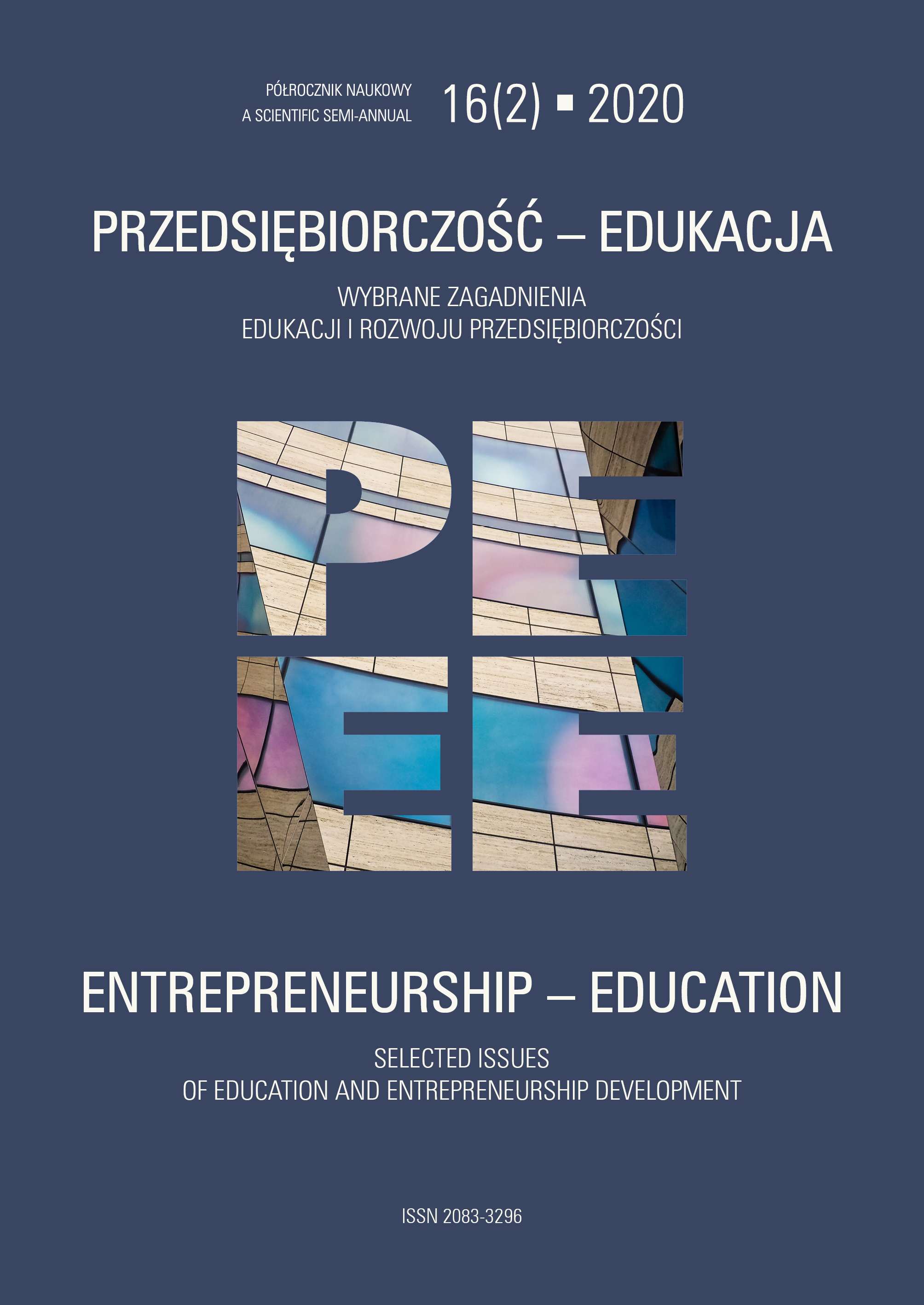Enterprising Early Childhood Education Teacher – Research Report
DOI:
https://doi.org/10.24917/20833296.162.3Keywords:
creativity, early childhood education teacher, entrepreneurial competences, enterpreneurship, innovationAbstract
Nowadays, during social changes which demand flexibility to accommodate to new conditions, entrepreneurship plays an important role. This ability is seen as one of the most important goals in modern education, including early childhood education. Considering dynamic and very often unpredictable work as an early childhood education teacher, entrepreneurship, mainly in the field of creativity and innovations in this job is necessary. It simplifies solving many educational problems, which frequently demand ability to deal with various situations and create new ventures. Teacher’s entrepreneurial attitude is also important for child’s development of entrepreneurship, which helps pupils to face changes in environment and to adapt to developing reality. Communication abilities, necessary to develop creativity, are discussed in the article. The aim of the article is a literature study in the field of educational entrepreneurship in relation to an early childhood education teacher and his competence in this area, as well as to determine the level of entrepreneurial competence of early childhood education teachers in the field of creativity and innovation and to diagnose them according to seniority based on own research.
References
Bird, B. (1995). Towards a theory of entrepreneurial competency. W: J.A. Katz, R.H. Brockhaus (red.), Advances in entrepreneurship, firm emergence and growth. Greenwich, CT: JAI Press, 51–72.
Borgiasz, M. (2017). Kompetencje przedsiębiorcze – ich rola i znaczenie w pracy współczesnego nauczyciela. Szkoła – Zawód – Praca, 14, 185–201.
Brzozowski, T. (2007). Przedsiębiorczość – pojęcie polisemiczne czy niewłaściwe rozumiane. Próba systematyzacji. Przedsiębiorczość – Edukacja [Entrepreneurship – Education], 3, 196–203.
Chandler, G., Hanks, S. (1994). Founder Competence, the Environment, and Venture Performance. Entrepreneurship Theory & Practice, 18(3), 77–89.
Choinkowska, E. (2012). Budowanie postaw przedsiębiorczych w pracy pedagogicznej przez oddziaływanie psychologiczne. Przedsiębiorczość – Edukacja [Entrepreneurship – Education], 8, 127–136.
Day, Ch. (2008). Nauczyciel z pasją. Jak zachować entuzjazm i zaangażowanie w pracy. Gdańsk: GWP.
Drucker, P.F. (1992). Innowacja i przedsiębiorczość. Praktyka i zasady. Warszawa: PWE.
Erikson, T. (2002). Entrepreneurial capital: the emerging venture’s most important asset and competitive advantage. Journal of Business Venturing, 17, 275–290. doi: 10.1016/S0883-9026(00)00062-8
Johannisson, B. (1993). Entrepreneurial Competence and Learning Strategies. W: R. Larsson, L. Bengtsson, K. Eneroth, A. Malm (red.), Research in Strategic Change. Lund: Lund University Press, 77–99.
Lans, T., Biemans, H., Mulder, M., Verstegen, J. (2010). Self-awareness of mastery and improvability of entrepreneurial competence in small businesses in the agrifood sector. Human Resource Development Quarterly, 21(2), 147–168. doi: 10.1002/hrdq.20041
Man, T., Lau, T., Chan, K.F. (2002). The competitiveness of small and medium enterprises. A conceptualization with focus on entrepreneurial competencies. Journal of Business Venturing, 17(2), 123–142.
Piróg, D. (2015). Kompetencje z zakresu przedsiębiorczości: rozważania teoretyczne i ich ilustracje w obszarze szkolnictwa wyższego. Przedsiębiorczość – Edukacja, 11, 364–376. doi: 10.24917/2764
Rozporządzenie Ministra Edukacji Narodowej z dnia 14 lutego 2017 w sprawie podstawy programowej wychowania przedszkolnego oraz podstawy programowej kształcenia ogólnego dla szkoły podstawowej, w tym dla uczniów z niepełnosprawnością intelektualną w stopniu umiarkowanym lub znacznym, kształcenia ogólnego dla branżowej szkoły I stopnia, kształcenia ogólnego dla szkoły specjalnej przysposabiającej do pracy oraz kształcenia ogólnego dla szkoły policealnej. Załącznik nr 2. Dz.U. 2017, poz. 356
Podzielska, M. (2009). Nauczyciel – lider – jak budować autorytet?. Warszawa: WSiP.
Rachwał, T., Kilar, W., Kawecki, Z., Wróbel, P. (2018). Edukacja w zakresie przedsiębiorczości w wychowaniu przedszkolnym, szkole podstawowej i szkołach średnich w świetle nowej podstawy programowej. Przedsiębiorczość – Edukacja [Entrepreneurship – Education], 14, 389–424. doi:10.24917/20833296.14.28
Strojny, J. (2007). Kształtowanie postawy przedsiębiorczej – procesy socjalizacji i autokreacji. W: P. Wachowiak, M. Dąbrowski, B. Majewski (red.), Kształtowanie postaw przedsiębiorczych a edukacja ekonomiczna. Warszawa: FPiAKE.
Downloads
Published
How to Cite
Issue
Section
License
Articles are published under the terms of the Creative Commons License (CC BY-ND 4.0; Attribution– NoDerivs).

